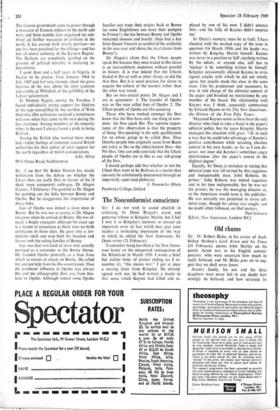Sir: I see that Mr Robin Horton has wisely withdrawn
from the debate on whether the Ubani Ibos are really Ibos in favour of his (I think more competent) colleague, Dr Alagoa (Letters, 7 February). I'm grateful to Dr Alagoa for pointing out the links between Bonny and Opobo. But he exaggerates the importance of those links.
Jojo of Opobo was indeed a slave once in Bonny. But he was not as young as Dr Alagoa imagines when he arrived in Bonny. He was al- ready a bright youngster although his exact age is a matter of conjecture as there were no birth certificates in those days. He grew into a for- midable adult and won both his freedom and favour with the ruling families of Bonny.
Jojo was that rare kind of slave who actually emerged as a contender to the Bonny throne. He founded Opobo primarily as a base from which to mount an attack on Bonny. He called for and got help from his Ibo countrymen. Thus the dominant influence in Opobo was always Ibo and the ethnographic flow was from Ibo- land to Opobo. Although indeed some Opobo families can trace their origins back to Bonny (as some Englishmen can trace their pedigree to France!), the ties between Bonny and Opobo remained tenuous and hostile. (Jojo had a key from Queen Victoria as symbol of his authority in the seas over and above the rival claims from Bonny!) Dr Alagoa's claim that the Ubani people speak Ibo because they once traded in Ibo slaves is an extraordinary statement without parallel in history. It is true indeed that the Ubanis traded in Ibo as well as other slaves; so did the Aro Ibos. But it is usual practice for slaves to acquire the culture of the masters rather than the other way round.
But on two crucial points Dr Alagoa and I are in agreement: 1. The founder of Opobo was an Ibo man called Jojo of Opobo. 2. The Ubani people of Opobo are lbo-speaking.
Those who have worked amongst the Ibos know that the Ibos have only one thing in com- mon : the Ibos speak Ibo. The supreme impor- tance of this observation is that the property of being 'Ibo-speaking' is the only qualification for an ethnic group to be called Ibos. Thus Onitsha people who originally came from Benin are today as Ibo as the oldest-known Ibos—the Nri Ibos. One can only conclude that the Ubani people of Opobo are as Ibo as any sub-group of the Ibos.
I should perhaps add that whether or not the Ubani Ibos want to be Biafrans is a matter that can only be satisfactorily determined through an impartially supervised plebiscite.
Pembroke College, Oxford J. Iheanacho Okole


































 Previous page
Previous page